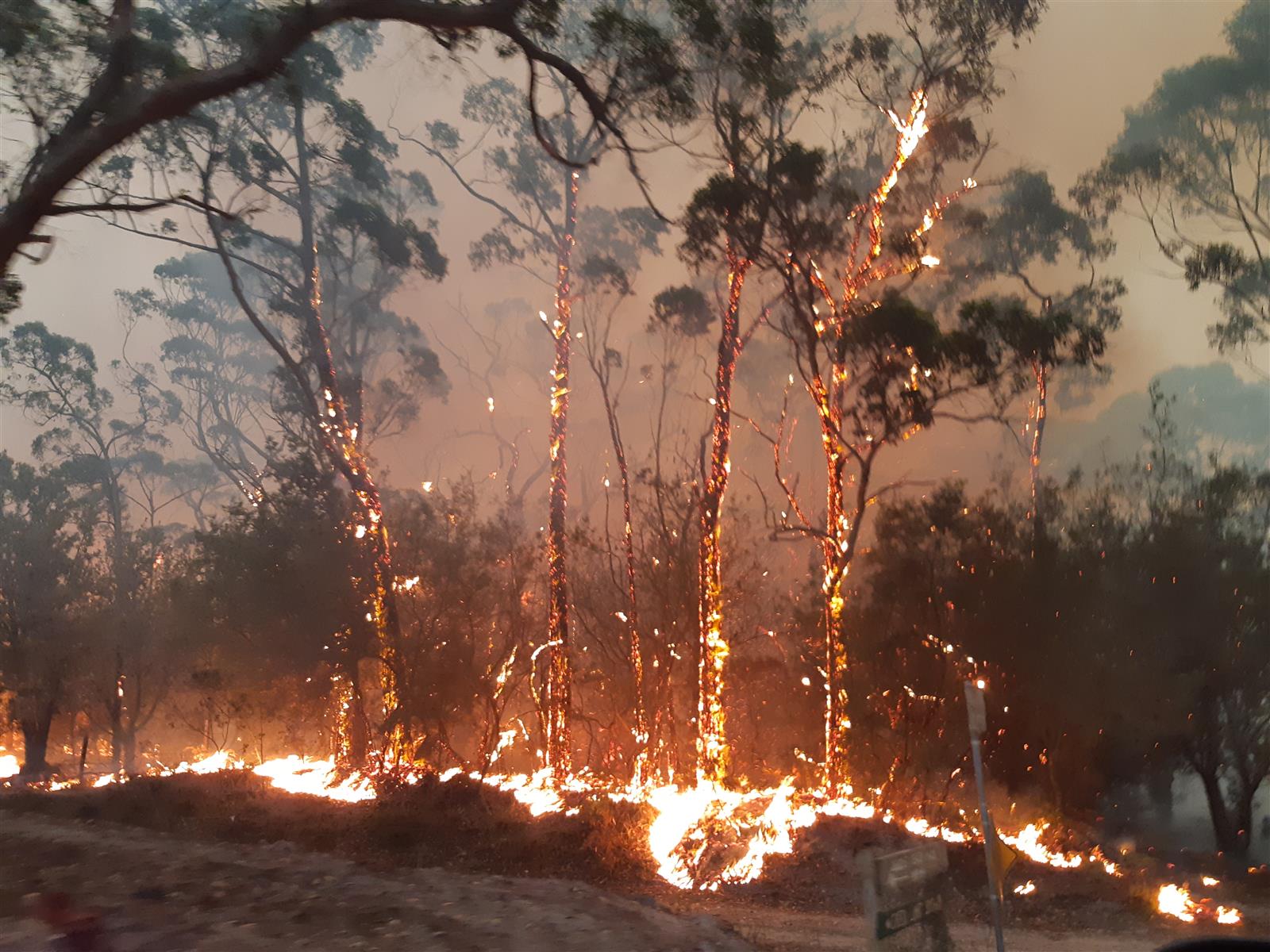 Image: Laura Tidey
Image: Laura Tidey
For Laura Tidey, the most memorable moment of the Black Summer fires came on 29 January 2020 at Cape Conran in Victoria’s far east.
The mother of three young children, Laura was on Orbost brigade’s tanker in a clearing at the Jungle Beach Caravan Park, completely surrounded by fire. The crew, which also had an FCV, was protecting cabins and sheds at the park, which was inland of the coast and enclosed by woodland.
Laura had expected to be home that night and had left her youngest, eightmonth-old Olivia, with her partner; Olivia was barely on solid food. “I knew she was in good hands, but it was hard to be away from her,” says Laura. “My partner and I had no way of contacting each other. With normal call-outs you know you’re going to be home. I didn’t expect to be trapped that night. And when the Captain said it might be a burn-over situation, that was worrying because I’ve never been in one before.”
But Laura, the brigade’s Fourth Lieutenant at the time, had faith in Dick Johnstone, Orbost Captain. “Dick always had a plan,” she says.
The brigade was split up into small groups that monitored each side of the caravan park, doused buildings with water and knocked down the fire every time it came in towards them. “We had crew really well prepared,” says Dick. “I spoke to most of them before. I think they were mentally right.”
At one point, Dick answered an emergency call about a man trying to protect the rental accommodation at the park and went to check on him. “He was adamant he was going to stay and protect,” he says. The fire was swirling around in different directions and shooting through the canopy, and Dick says it got “pretty close” at times during the night.
Three hours in, the wind picked up speed from 30 to 80 kilometres per hour, then abruptly changed direction. “Just as it nearly went over the top of the caravan park, the wind turned it away,” says Laura.
By 9am the next day, the fire had settled. It burnt back on itself in one direction and stopped at the coast in another. The firefighters drove slowly back to the Princes Highway, on alert for dropping debris and tree limbs.
The Cape Conran fire came towards the end of Orbost brigade’s campaign in the 2019–20 fires – the main fire affecting the town itself had hit a month earlier. It arrived in the early hours of 30 December 2019, coming from Buchan to the north west. The brigade was well-prepared for the approaching fire, but when the ember attack ahead of the front hit the town and the wind changed, it came closer than they expected.
“It got to within 200 metres of the town and lit up areas at the northern end where there are about 60 houses,” says Dick. “If we hadn’t got in there, it had the potential to wipe out the top end of Orbost.” Laura was surprised that the fire got within the housing estate she lives in.
The firefighters hit the blaze hard from six trucks, while flames shot out 40 metres. “I ran a team of dozers and trucks,” says Dick. “It burnt a lot of farmland but I don’t think we lost any houses at that stage. A few houses and sheds were lost on the outskirts of town though.”
The Orbost firefighters, together with DELWP members, protected important infrastructure such as the hospital, school, water supply and communications tower, and hosted people who evacuated their homes late at the fire station. Fighting the fire at the recycling depot was especially difficult. “The smoke was so thick we couldn’t see what we were doing and the wind kept changing direction,” says Laura.
By 4am the next day, the main danger to Orbost had passed as the fire moved into the Cann River and Bemm River areas. Dick and other members of the brigade then performed a number of other roles, including helping police escort people out of Cann River when fire hit there. “It was pretty full-on,” he says, adding: “I was proud of the achievements of our crew. I believe our preparedness before the fires probably saved us.”
This readiness included helping residents prepare their properties, meetings with DELWP, and community meetings held at the cricket and footy clubs. The efforts of farmers with water carts putting out spot fires also helped greatly to stop the spread of fire, says Dick.
“I think the crew all worked really well and had the same focus on protecting people first and properties,” says Laura. “I learnt a lot, probably more than I would in a year.”
Dick was also happy with how the Orbost community came together during the campaign. “They really got behind and supported us,” he says. “Any time something big happens, the whole community’s really good at working together.”
To acknowledge the incredible efforts of Orbost brigade and the other local emergency services in fighting the Black Summer fires, a mural was commissioned on the side of the Orbost Club Hotel depicting representatives of each of the services.
Brigade members involved: 17
Range of experience: from 3 to 45 years
Supporting roles: non-operational members note-taking during operations and cooking meals
Areas: Simpsons Creek, Cape Conran, Marlo, Buchan area, Cann River, Bemm River, Wairewa, NSW
Campaign duration: 25 November 2019 to late January 2020
Laura’s story is one of many of the 2019-20 fires profiled in the new book, Our Black Summer. The entire book can be read online on the CFA website.